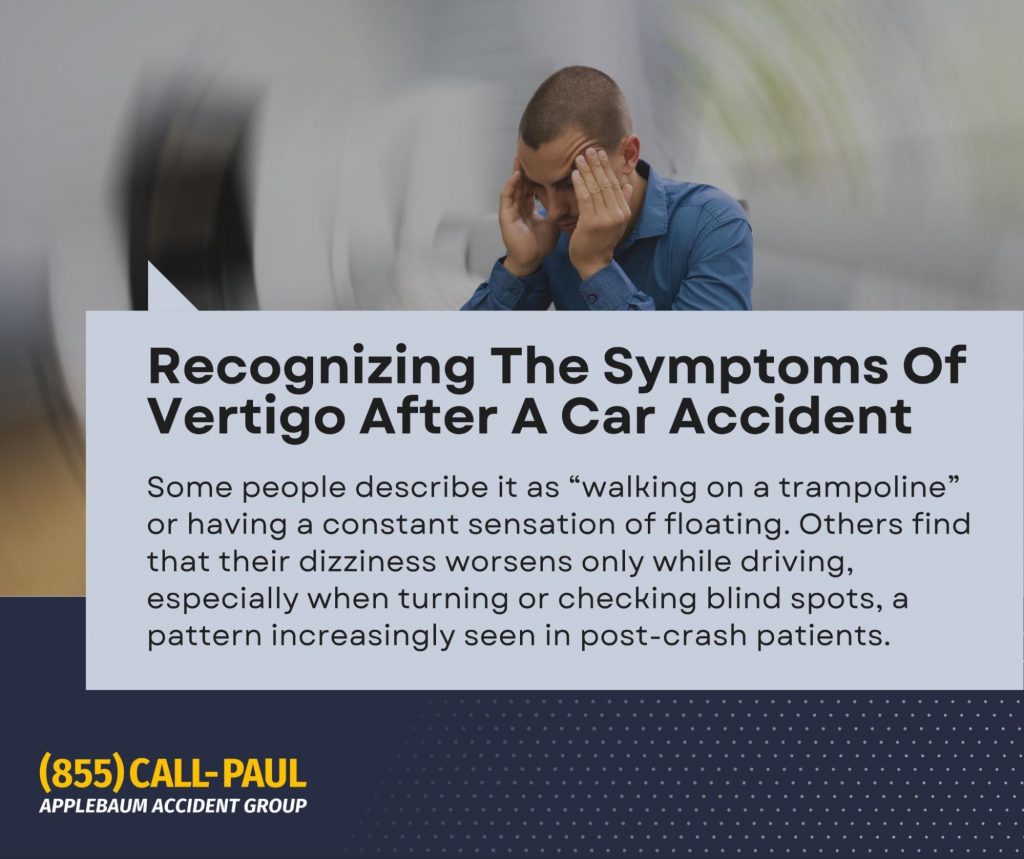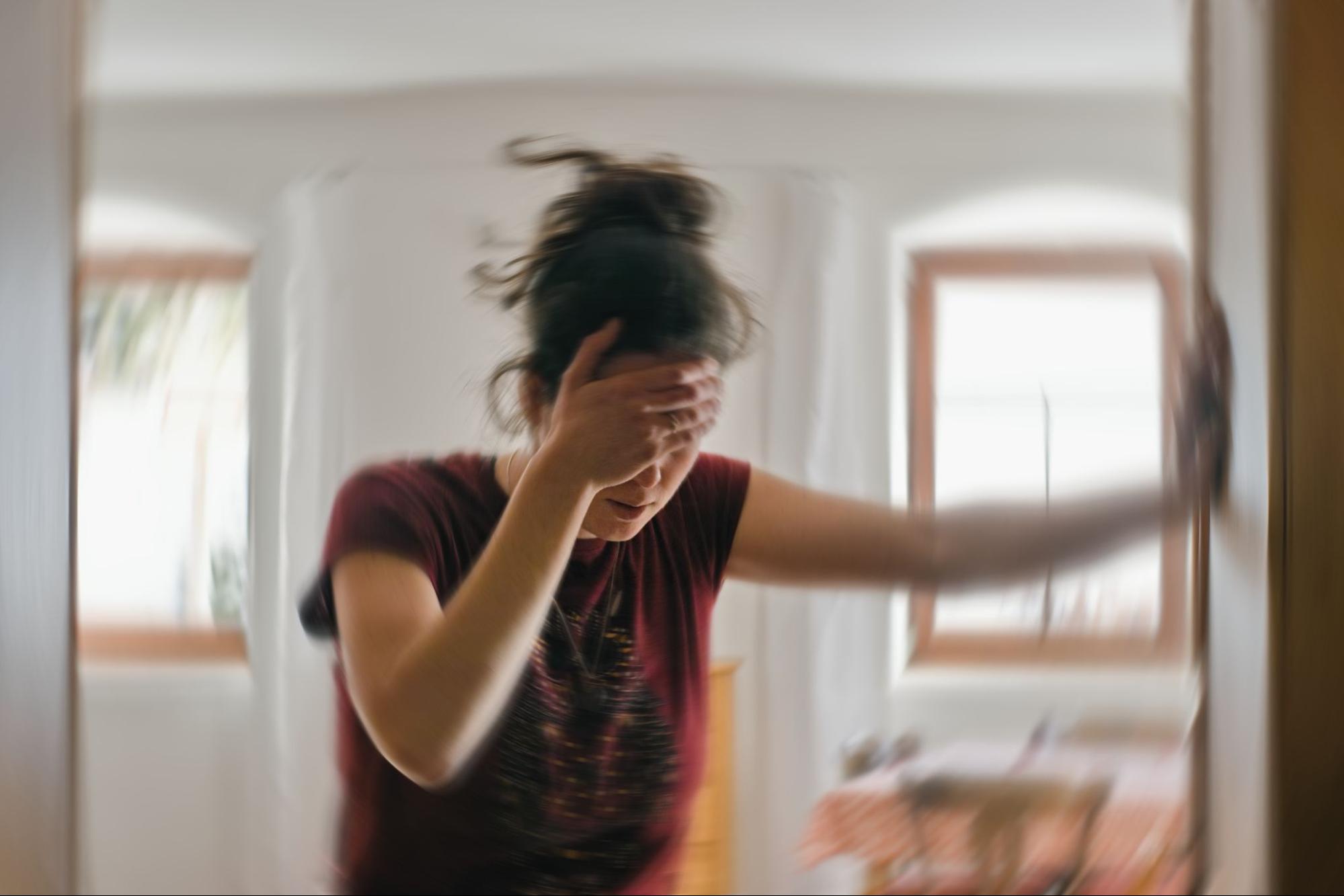Yes, dizziness and vertigo after a car accident can be grounds for a personal injury claim in Florida, especially when symptoms are medically documented and affect daily function.
The key is linking the symptoms directly to accident-related trauma like whiplash or concussion.
In this guide, we’ll explain when vertigo qualifies as a legitimate injury, how to prove it, and what kind of compensation might apply.
We’ll also cover common worries like whether these claims are taken seriously, and what happens if imaging scans don’t show anything.
Can Vertigo Be Caused by a Car Accident?
You don’t need a high-speed collision to end up feeling off-balance. In fact, even a low-speed crash can jolt the head or neck hard enough to disrupt your body’s equilibrium. These events often affect the vestibular system, the part of your inner ear and brain that controls balance and spatial orientation.
One of the most frequently diagnosed causes of vertigo after a car crash is Benign Paroxysmal Positional Vertigo (BPPV).
It’s a condition that arises when crystals in the inner ear shift out of place, typically triggered by head trauma. Sudden movements like turning your head or looking up while driving can then cause spinning sensations, dizziness, or nausea.
Vertigo also frequently stems from whiplash, which can damage the cervical spine or even the brainstem. This disrupts the signals your brain receives about your position in space, leading to imbalance and lightheadedness.
Concussions, even mild ones, can add another layer by triggering vestibular dysfunction, which includes dizziness, motion sensitivity, and visual disturbances.
It’s worth noting that many of these injuries don’t show up right away. Symptoms can take days or even weeks to surface, which is why it’s so easy for victims to dismiss them or chalk them up to stress.
Recognizing the Symptoms

You might experience a sense that the room is spinning, trouble focusing your vision, or a sick feeling in your stomach.
Some people describe it as “walking on a trampoline” or having a constant sensation of floating. Others find that their dizziness worsens only while driving, especially when turning or checking blind spots, a pattern increasingly seen in post-crash patients.
These aren’t just annoying symptoms. They can interfere with your ability to work, drive, and function normally, making it vital to track when they began and how often they occur.
How It’s Diagnosed (Even When Imaging Looks Normal)
The diagnostic process usually starts with vestibular testing, including positional maneuvers like the Dix-Hallpike test, which helps identify BPPV.
Imaging tools like MRIs may be ordered to rule out more serious issues like skull fractures or inner ear damage, but they often come back clear even when vertigo is very real.
This leads many patients to worry: “If nothing shows up on the MRI, does that mean I’m fine?” Not at all. A clean scan doesn’t invalidate your symptoms.
In many cases, the diagnosis is clinical, meaning it’s based on your symptom history and physical evaluation, not just imaging.
Is Dizziness a Valid Injury Claim in Florida?
If you’re wondering whether dizziness counts as a “real” injury in the legal world, here’s the short answer: yes, if it’s properly documented and linked to the crash.
Florida requires that you seek medical attention within 14 days of an accident to be eligible for personal injury protection (PIP) benefits. This includes seeing a doctor who can evaluate whether your symptoms rise to the level of an Emergency Medical Condition (EMC).
The good news? That EMC determination can happen even after the 14-day window, so long as you’ve initiated care within the required timeframe.
At TeleEMC, we saw this confusion firsthand, chiropractors and patients alike had a hard time navigating what counts and what doesn’t. That’s part of why we launched Applebaum Accident Group: to help everyday people get the medical and legal support they need without falling through the cracks.
When Vertigo Warrants Compensation
If your vertigo prevents you from working, driving, or doing everyday activities, you may qualify for compensation. This holds true even if you didn’t miss work, but found yourself struggling to stay focused, afraid to drive, or dealing with daily bouts of imbalance.
In cases where the cause is psychological as well as physical, therapies like EMDR (Eye Movement Desensitization and Reprocessing) have proven helpful.
When therapy is documented as part of your treatment, it reinforces your claim and shows that you’ve taken steps to recover.
Still worried your case won’t be taken seriously? You’re not alone.
What Am I Entitled To After a Florida Car Accident?
Economic Damages: More Than Just Medical Bills
If you’re experiencing vertigo after a crash, your claim isn’t limited to the ER visit. Florida’s PIP coverage allows you to recover a portion of your medical costs, including appointments with neurologists, chiropractors, ENT specialists, and vestibular therapists.
Many accident victims also miss time from work, not always full days, but enough to cause income disruption. Others are forced to reduce hours or switch to less demanding roles. In these cases, lost wages and reduced work capacity can be factored into your claim.
Non-Economic Damages: When the Injury Goes Deeper
You don’t need broken bones to be suffering. Vertigo often brings anxiety, panic attacks, and the nagging fear of dizziness striking at the worst possible moment, especially while driving.
These experiences fall under pain and suffering and can carry legal weight if documented properly.
Even simple joys like grocery shopping, attending your child’s game, or driving to work without fear can be compromised. That’s where loss of enjoyment of life comes into play. If symptoms prevent you from engaging with your life fully, you deserve to be compensated for that loss.
Hidden Impact: Mental Fog, Missed Moments
One of the most misunderstood effects of post-trauma vertigo is cognitive strain. Many patients report feeling detached, forgetful, or mentally “cloudy”, a direct result of vestibular dysfunction.
These subtler symptoms rarely appear on imaging, but they can erode your quality of life.
Your ability to function at home or on the job, while technically “working”, may be diminished. That nuance can be lost on adjusters and jurors unless it’s clearly articulated in your claim.
What’s the Typical Settlement Amount in Florida for These Cases?
The value of your case depends heavily on three variables:
- Severity of symptoms and how clearly they’re documented
- Consistency of medical treatment, including therapy and follow-up
- How your daily life has been affected, including career or driving restrictions
A delay in seeking care or failure to follow your treatment plan can drastically reduce your potential payout. On the other hand, medical records, therapy logs, and expert opinions carry real weight.
Real Case Ranges
Most dizziness-related accident claims in Florida resolve between $5,000 to $25,000, especially when the injury doesn’t involve surgery or hospitalization. However, higher settlements are possible when dizziness leads to extended time off work, long-term therapy, or clear interference with daily activities.
Insurers often try to minimize “invisible” injuries like vertigo, arguing there’s no objective proof. That’s why your case must be built with layers of validation, from daily journals to EMDR therapy notes and specialist opinions.
Curious how pain and suffering is calculated in Florida cases? Check out our articles on the Average Settlement For Pain and Suffering After a Car Accident in Florida.
Can You Sue for Pain and Suffering from Vertigo?
Yes, but you’ll need documentation.
To pursue non-economic damages, your attorney must show that your dizziness causes real, ongoing disruption. This includes medical records from providers, notes from therapists, and ideally a personal impact journal, a simple log of how your symptoms affect your day-to-day life.
If you’ve undergone vestibular rehabilitation, EMDR therapy, or other consistent treatment methods, that evidence strengthens your case. The more you demonstrate how hard you’ve worked to get better, the more seriously your claim will be taken.
Handling Doubt and Pushback
You may hear: “You’re still working, how bad can it be?” Or, “You’re not in a wheelchair, why are you suing?” These assumptions ignore the reality that vertigo is episodic, invisible, and highly disruptive.
By tracking flare-ups, collecting witness statements, and showing how your condition impacts even routine tasks, you can make the invisible visible, and protect your claim against dismissal.
What To Do If You Think You Have Vertigo From a Crash
Step-by-Step Guide
If you’re feeling dizzy, disoriented, or off-balance after a car accident, even if it’s been a few days, don’t ignore it. Vertigo may signal a deeper injury that could qualify for compensation, but only if you take the right steps:
- See a medical provider within 14 days: Florida’s 14-day PIP rule requires prompt care. Even if your symptoms are mild or delayed, getting checked creates the medical record your case needs.
- Document every symptom in a journal: Log when the dizziness occurs, what triggers it, how long it lasts, and how it interferes with your life. Journaling builds a timeline that strengthens your legal claim.
- Get referrals to vestibular or neurological specialists: Primary care is just the start. Dizziness often requires input from ENT doctors, neurologists, or vestibular therapists who understand these types of injuries.
- Ask for diagnostic testing and therapy notes: Even if your MRI comes back clean, ask for vestibular assessments, positional tests (like Dix-Hallpike), and clinical impressions from every visit.
- Contact a referral service to explore your legal options: Don’t guess your way through this. Legal support can help you understand if your case qualifies, and what it might be worth.
When You’re Ready, Get Connected With Help That Understands
Dizziness doesn’t always show up on a scan, but it shows up in your life. It keeps you from driving, focusing, working, or enjoying the things that used to come easily. And too often, accident victims are left wondering if their symptoms are even real, let alone compensable.
At Applebaum Accident Group, we see cases like this every day. That’s why we’ve built a system that connects injured Floridians to lawyers and doctors who do take their symptoms seriously.
Here’s how we help:
- We match you with attorneys who understand how to prove vestibular and neurological injuries. They know how to argue for symptoms that don’t show up on X-rays.
- We connect you with qualified medical professionals, including vestibular specialists, across Florida. No guessing. No delays.
- We help streamline the process so you can focus on healing, not paperwork or pushback from insurers.
Applebaum Accident Group connects you with trusted attorneys who understand what your case is worth, and how to make sure you don’t settle for less.
📞 855-225-5728 | Request Your Free Consultation Now





